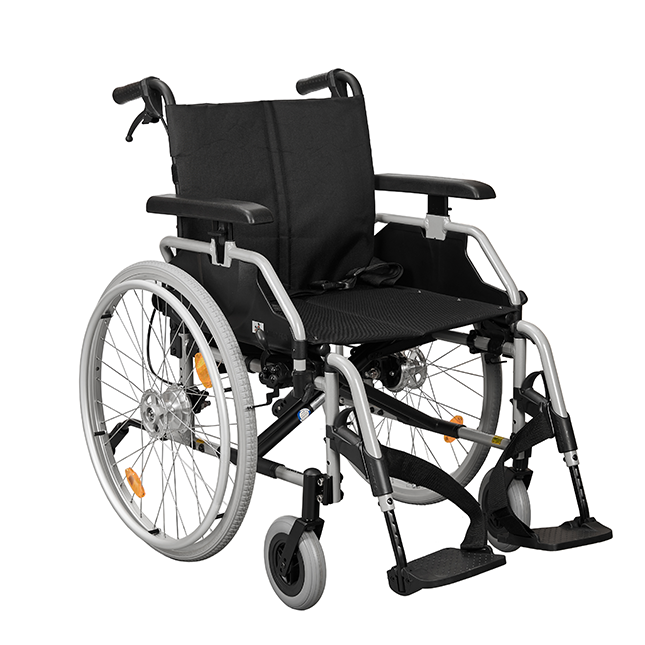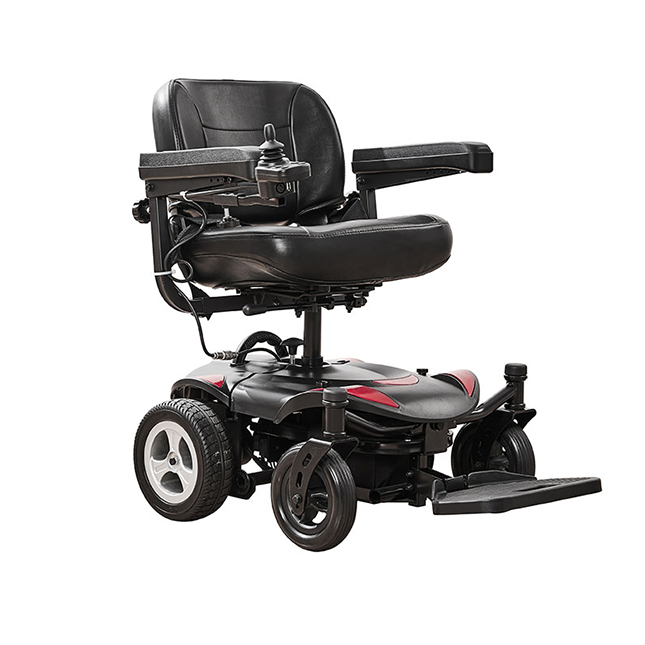一.Introduction
- The importance of choosing the right wheelchair
The importance of choosing the right wheelchair cannot be overstated as it directly affects the quality of life and mobility of people with physical disabilities. A wheelchair is not only a means of transportation, but also an important tool for individuals to participate in daily activities, socialize, and maintain independence. Therefore, choosing the right wheelchair is crucial to ensure comfort, safety, and functionality.
One of the key factors to consider when choosing a wheelchair is the individual’s specific needs and physical condition. Different types of wheelchairs are designed to meet different needs, such as manual wheelchairs for people with sufficient upper body strength, power wheelchairs for people with limited mobility, and specialized wheelchairs for specific medical conditions. Assessing the user’s mobility, posture, and comfort requirements is critical to determining the most appropriate wheelchair.
Additionally, the size and dimensions of your wheelchair play an important role in ensuring proper fit and support. An ill-fitting wheelchair can cause discomfort, pressure sores and musculoskeletal problems. Therefore, factors such as seat width, depth, and height must be considered, as well as the location of armrests, footrests, and backrests to provide optimal support and alignment for the user.
Another important aspect to consider is the environment in which the wheelchair will be used. Factors such as maneuverability in small spaces, accessibility in different environments, and transportation requirements should be considered. For example, people with active lifestyles may need a lightweight, portable wheelchair, while people who sit for long periods of time may benefit from enhanced comfort and pressure-relieving features.
Additionally, the durability and quality of a wheelchair are crucial for long-term use. Purchasing a well-constructed wheelchair can avoid frequent repairs and replacements, ultimately saving time and resources. It is important to consider materials, construction and maintenance requirements to ensure the wheelchair can withstand daily use and provide reliable performance.
In summary, choosing the right wheelchair is a critical decision that directly affects the well-being and mobility of people with physical disabilities. By considering the specific needs of the user, physical condition, environment and the quality of the wheelchair, individuals can improve their comfort, independence and overall quality of life. Therefore, a thorough evaluation and consultation with a healthcare professional is crucial to selecting the most appropriate wheelchair for each individual.
- Overview of different types of wheelchairs
When choosing the right type of wheelchair, it is important to consider the user’s specific needs and preferences. There are many types of wheelchairs available, each designed to suit different requirements and lifestyles. One popular type is a manual wheelchair, which is propelled by the user or caregiver pushing the wheels. These wheelchairs are lightweight, portable, and easy to operate and are suitable for people with good upper body strength and mobility.
Another type of wheelchair is a power wheelchair, which is electric and controlled using a joystick or other input device. These wheelchairs are ideal for individuals with limited mobility or strength as they provide greater independence and the ability to easily traverse a variety of terrains. Electric wheelchairs come in different models, including mid-wheel drive, rear-wheel drive, and front-wheel drive, each offering unique features and benefits to meet the needs of different users.
- The factors that should be considered when choosing a wheelchair
When selecting a wheelchair, it is crucial to carefully consider various factors to ensure that it meets the specific needs of the user. One key aspect to keep in mind is the level of comfort and support that the wheelchair provides. It is essential to choose a wheelchair that offers adequate cushioning and back support to prevent discomfort and potential health issues.
Additionally, the mobility and maneuverability of the wheelchair are important factors to consider. The wheelchair should be easy to navigate in different environments, such as tight spaces or uneven terrain. This will allow the user to move around independently and efficiently.
Furthermore, the durability and quality of the wheelchair are crucial for long-term use. It is important to choose a wheelchair made of high-quality materials that can withstand daily wear and tear.
Overall, selecting the right wheelchair involves a careful evaluation of various factors to ensure that it meets the specific needs of the user. By considering aspects such as comfort, mobility, and durability, you can choose a wheelchair that provides the necessary support and functionality for daily use.
二. Type of Wheelchair
- Manual wheelchair
- Features and Benefits
When choosing a manual wheelchair, it is important to consider its features and benefits to ensure it meets your specific needs. Understanding the features and benefits of a manual wheelchair can help you make an informed decision and choose the option that best suits your mobility and comfort.
The characteristics of a manual wheelchair play a crucial role in determining its functionality and usability. Some important features to consider include the weight and size of the wheelchair, frame material, wheel size and type, seating options, and adjustability. A lightweight, collapsible frame makes transport and storage easier, while durable materials like aluminum or titanium ensure long-term reliability. Larger wheels provide better maneuverability and outdoor performance, while adjustable seat options provide personalized comfort.
On the other hand, the benefits of a manual wheelchair directly impact the user’s daily life and overall well-being. Enhanced mobility and independence are among the major benefits, allowing individuals to navigate their surroundings more freely. Manual wheelchairs also promote physical activity and upper body strength because self-propulsion is a form of exercise. Additionally, the compact design of manual wheelchairs allows users to easily enter tight spaces and maneuver through congested areas with ease.
Specifically, the features and benefits of manual wheelchairs help improve the user’s quality of life. For example, the lightweight and foldable design makes travel worry-free, allowing users to maintain an active lifestyle without being restricted by mobility aids. The durability of the frame and wheels ensures long-lasting performance, reducing the need for frequent repairs or replacements. Additionally, customizable seating options and adjustable features cater to individual comfort and support needs, promoting better posture and reducing the risk of pressure ulcers.
2.Suitable users and scenarios
Manual wheelchairs are essential mobility aids for people with mobility disabilities. They are suitable for a wide range of users and scenarios, providing independence and freedom of movement. Understanding the appropriate users and scenarios for manual wheelchairs is critical to ensuring that individuals receive the right mobility solution for their specific needs.
Suitable users of manual wheelchairs include people with temporary or permanent mobility impairments, such as people with spinal cord injuries, amputations, muscular dystrophy, cerebral palsy or other conditions that affect the ability to walk. Manual wheelchairs are also suitable for seniors who have difficulty walking for long periods of time. Additionally, individuals recovering from injury or surgery may benefit from using a manual wheelchair during the recovery process.
In terms of scenarios, manual wheelchairs are versatile and can be used in various environments. They are suitable for indoor use, allowing users to easily navigate around homes, workplaces and other indoor spaces. Manual wheelchairs are also suitable for outdoor use, allowing individuals to move around parks, sidewalks, and other outdoor areas. They are particularly useful in situations where the terrain is uneven or inaccessible with a traditional walker.
Additionally, manual wheelchairs are suitable for those with active lifestyles who may need a portable, lightweight mobility solution. They can be easily transported in a vehicle and are ideal for those who want to remain independent and participate in a variety of outdoor activities.
When choosing a manual wheelchair, it is important to consider the specific needs and preferences of the user. Factors such as the user’s strength, flexibility and lifestyle should be considered to ensure the wheelchair meets their requirements.
- Electric wheelchair
Electric wheelchairs have revolutionized mobility for people with disabilities, offering a range of advantages and limitations. Understanding these factors is crucial for anyone considering a power wheelchair.
Advantages of electric wheelchairs:
- Enhance mobility: Electric wheelchairs provide people with mobility impairments the freedom to move independently indoors and outdoors without relying on the help of others.
- Reduce physical pressure: Unlike manual wheelchairs, electric wheelchairs are powered by motors, which reduces the physical exertion required to push the wheelchair, especially for people with limited upper body strength.
- Customization: Many power wheelchairs offer customizable features such as adjustable seats, spatial tilt capabilities, and specialized controls, allowing users to tailor the chair to their specific needs.
- Long-distance travel: Electric wheelchairs are designed to cover longer distances and are suitable for people who often need to travel long distances.
Limitations of electric wheelchairs:
- Cost: Electric wheelchairs can be significantly more expensive than manual wheelchairs, making them more difficult to use for individuals with limited financial means.
- Maintenance and Repair: Electric wheelchairs require regular maintenance and are prone to technical issues that can lead to expensive repairs and downtime.
- Weight and size: Some power wheelchairs are larger and heavier than manual wheelchairs, making them less maneuverable in small spaces and difficult to transport.
- Battery life: Electric wheelchairs’ reliance on battery power means they need to be recharged regularly, and users may experience limited mobility if the battery unexpectedly dies.
三.Factors to consider when choosing a wheelchair
- Comfort and support
- Mobility and Maneuverability
- Portability and Storage
- Durability and Maintenance
Post time: Sep-09-2024


